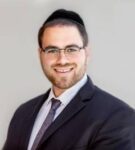By Rabbi Daniel Reich

LA JOLLA, California — Parshat Tetzaveh primarily deals with Aharon and his sons becoming Kohanim, detailing the standard Kohain attire, including the head covering, shirt, pants, and belt. The Kohain Gadol adds four garments, including a long outer robe, quilted vest, jeweled breastplate, and engraved forehead plate. Shoham stones, inscribed with the 12 Tribes, adorn the Kohain Gadol‘s shoulders. The Kohain Gadol’s unique vestments incorporate a special thread, including pure gold. The subsequent Aliyot cover a seven-day consecration ceremony for Kohanim and the consecration of the Altar. The final Aliya introduces the inner golden Altar for the daily incense offering, exclusive to the Kohain Gadol.
Though most of the Parsha deals with the above Halachot, the Torah in the beginning of the parsha opens with instructions to use pure olive oil for the Menorah and the daily service of lighting the Menorah in the Beit HaMikdash.
As the Torah states (ch. 27, 20-21): “(20) You shall further instruct the Israelites to bring you clean oil of beaten olives for lighting, for kindling lamps regularly. (21) Aaron and his sons shall set them up in the Tent of Meeting, outside the curtain which is over [the Ark of] the Brit, [to burn] from evening to morning before Hashem. It shall be a due from the Israelites for all time, throughout the ages.”
Rashi explains that “Katit La’Meor – beaten olives for lighting” means that the oil from the olives needed to be pressed gently by hand to ensure that no sediments were mixed with the oil. The oil used for the Menorah needed to be very pure.
Rashi then goes on to tell us that they took the olives after they were pressed and ground them up to extract the rest of the oil to use for another one of the temple services – the Korban Mincha – the meal offering – which does not require the high-quality pure gently pressed oil.
What is the Torah trying to teach us with this mandate to use the best oil for lighting the Menorah, whereas for the meal-offerings, the Menachot, we are only required to use this secondary oil? (Interestingly, it is noteworthy that the norm is for us to use our best oil for cooking and meal prep, but for lamp fuel, we are ok using subpar oil as long as it lights well – just the opposite!)
So the Midrash Tanchuma asks – why is it that when it comes to the lighting of the menorah we need to use the best oil, but when it comes to the meal offering, we use this secondary oil?
Perhaps we can present two answers:
1- The Kli Yakar answers that too often in life we end up using our better, “good oil”, for pursuits that should be lower on our priority list. We exert our money, time, and energy into the mundane, and less important. While our “secondary oil” is being put towards that of higher importance. Putting our leftover oil towards Torah, Mitzvot, Chesed, charity, communal growth, education, etc.
The Torah here is trying to illustrate for us that in order to “light up” our lives and the lives around us, in order to find meaning in our lives, we need to make sure we are expending our “best oil” for Torah and spiritual pursuits! Leftover, “secondary oil” is still good oil, that is needed to be put towards other secondary yet important pursuits, but we need to make sure we are putting our “best oil” towards pursuits of the highest order.
2- The olive oil used to light the Menorah had to be oil that comes from the effort of someone who pounds the olives in a mortar and must not grind them in a mill. We see from here that no shortcuts may be used in the production of the Menorah’s fuel. It all had to be done by hand, which seems less efficient but teaches a critical lesson: When it comes to learning Torah, there can be no shortcuts or crash courses to attain true understanding. It takes time and effort to create illumination.
Just as the Sefas Emes writes – “Ayin Kedusha Bli Hachanah – holiness only comes through proper preparation.” This is one of the lessons of the Menorah.
These two lessons of the Menorah’s oil – 1) Keeping our priorities straight and making sure we exert our resources according to what is truly important; and 2) not trying to take shortcuts, but recognizing that creating meaning in life requires hard work – can help us in our ongoing pursuit of bringing more light into the world. Just as Shlomo Hamelech writes in Mishlei – “Ki Ner Mitzvah V’Torah Ohr – For the Mitzvah is a lamp, The teaching is a light”.
The Torah we bring into the world is light. We, as the chosen nation, are given the mission of bringing more of that light into the world, unlike the evil which sadly is so obviously apparent now. But to bring in that light, we need to be certain that we are using our “best oil” in the lamps of Torah and kindness – to illuminate the world!
*
Rabbi Daniel Reich is the spiritual leader of Congregation Adat Yeshurun.